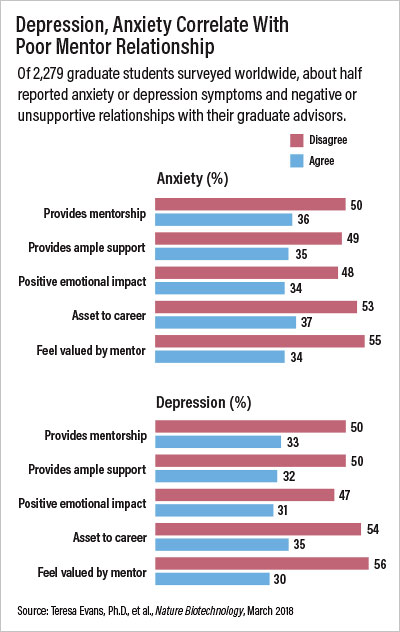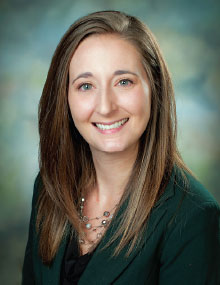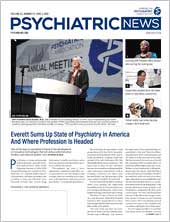Long hours in a lab, arduous qualifying exams, and the continual threat of “publish or perish” are just a few of the pressures that graduate students across academic disciplines face. As these stressors build up, so too do the risks of negative psychological outcomes and burnout.
The results of a recent international survey highlight the scope of this potential problem: graduate students are about six times as likely to report symptoms of anxiety and/or depression compared with the general population.
The survey, which was completed online by 2,279 graduate students at 234 institutions worldwide, included questions from the Generalized Anxiety Disorder 7-item scale and Patient Health Questionnaire-9 scale. As was reported in Nature Biotechnology, 41 percent of these respondents reported at least moderate anxiety symptoms and 39 percent reported at least moderate depression symptoms.
While previous surveys at individual universities have reported similar rates of mental health issues among their graduate students, this study suggests depression and anxiety in this population may cut across schools and academic disciplines. Similar rates of depression have been reported in the medical trainee community as well. (A 2016 analysis in JAMA reported that about 30 percent of medical students have depression or depressive symptoms.)
Study co-author Lindsey Bira, Ph.D., an assistant professor of psychiatry at the University of Texas Health Sciences Center (UT Health) in San Antonio said that it makes sense that graduate and medical students would have similar rates of anxiety and depression
“Anytime you are placed in a position where you must grow, you will face stressors that increase the risk of mental illness,” she told Psychiatric News. “These programs bring together students who were all high functioning in college, and now everyone has to redefine who they are, and that can be difficult.”
Positive social support is important in such new environments. Of the graduate students who reported symptoms of anxiety and/or depression, 50 percent said their advisor did not provide mentorship, 54 percent said the advisor did not provide career assistance, and 56 percent said they did not feel valued by their advisor.
The survey indicated that work-life balance was another factor associated with depression and/or anxiety in the graduate trainees. A total of 56 percent of students with anxiety symptoms and 55 percent with depression symptoms reported an unhealthy work-life balance.
“We hope that this study will start a national conversation [among administrators] that will lead to better support mechanisms to help all those training in the trenches find mentorship,” said co-author Teresa Evans, Ph.D., director of the office of career development at UT Health San Antonio. Evans speaks from experience, having graduated from UT Health with a neuroscience degree in 2014 and witnessing many of these symptoms among her peers.
Evans said that she also hopes this data will show trainees experiencing depression and anxiety that they are not alone and encourage them to come forward and seek support from university wellness centers or career development offices like hers. “The academic community is not a place to work in isolation,” she said.
This study was funded in part by the UT Health San Antonio Graduate School of Biomedical Sciences. ■
An abstract of “Evidence for a Mental Health Crisis in Graduate Education” can be accessed
here. The 2016
JAMA study, “Prevalence of Depression, Depressive Symptoms, and Suicidal Ideation Among Medical Students” is available
here.


